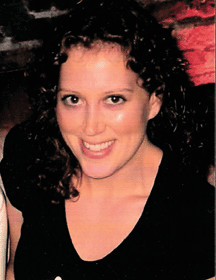Outsider On The Inside
Cari Lynn: Life On The Trading Floor
by Jayanthi Gopalakrishnan
Cari Lynn is a Chicago-based journalist and the author of Leg The Spread: A Woman's Adventures Inside The Trillion-Dollar Boys' Club Of Commodities Trading. In researching Leg The Spread, Lynn spent two years at the Chicago Mercantile Exchange (CME), following around the handful of women who brave the male-dominated trading pits. Lynn holds a master's degree in writing from Johns Hopkins University and a bachelor's in journalism from the University of Maryland. She has ghost-written two other books of nonfiction, and has also written for numerous newspapers and magazines, including O, The Oprah Magazine, Health, Good Housekeeping, The Chicago Tribune, Washingtonian, San Francisco magazine, and Chicago magazine. She has worked on Capitol Hill for the Press Secretary of the House Commerce Committee, and has also taught English at Loyola University and creative writing at Columbia College.STOCKS & COMMODITIES Editor Jayanthi Gopalakrishnan interviewed Cari Lynn via telephone on March 9, 2006.

Trading really sucks a lot out of you. I learned that my mind doesn't work that way. I can't tolerate that kind of risk.
A friend of mine daytraded from home. She also happened to own a seat at the Chicago Board of Trade (CBOT). In 2000, when the Internet bubble burst, she watched her account plummet, and was bemoaning the fact that the people on the floor were actually profiting from this. I didn't understand what that meant. I didn't know the first thing about futures trading, but I knew she owned the seat. I said, "Why don't you use it? You know how to trade. You've been successfully trading for several years now." And she said she didn't trade on the floor because she was afraid. I had no concept why a woman, in this day and age who was adept at her career, would be so afraid. So that got me curious.
We went down to the floor and I had never seen anything like it. I immediately understood her fear. I couldn't spot any women. I was also blown away by the fact that here was this whole other world and it was just down the street from me. People don't have any idea what really goes on there. I knew there were stories waiting to be told. I became fascinated with how the handful of women working on the floor were making it in this really vicious, physical, man's world. Really, it is one of the last male bastions in society.
It takes a special kind of woman to survive in the pits. There is a whole spectrum of women on the trading floor. It is certainly no secret that there are many women who are there because there are a lot of men and a lot of money. Then on the opposite end of that spectrum are the women who really lost all femininity. Unfortunately, both these types were often held in low esteem by the male traders. So somewhere in that delicate middle are the really successful women traders. It takes a lot of savvy for a woman to find success on the floor. You have to know yourself, and go in there with a good head on your shoulders and a strong sense of self to make it. Just knowing how to trade isn't enough.
So what did you see in terms of reaction from other traders? What variables or numbers do they react to?
That's a good question. In the pits there was certainly a lot of reaction to things happening at the moment. It always fascinated me how the traders didn't care why something was happening. I always wanted to know why the markets just plummeted at a certain point. To me, especially as a journalist, that was much more important. But I learned that didn't matter.
What did you notice the most?
The reaction to the brokers. On the floor, crammed next to each other in pits, is where you really get to know people, and traders would react when they saw a broker look nervous, or busy, or harried, or worried. A lot of traders fear the computer side of trading because all that is eliminated. There is a quote in my book when the financial pits were opening up and The Wall Street Journal interviewed someone about transitioning from trading pork bellies to the financials. A pork belly trader said, "Numbers is numbers."
While some traders have embraced the screens, others have been very resistant because so much of what they pay attention to is gut and instinct and the dynamics of the pit.
It seems to me that traders who trade at home from their monitors are missing out on a major aspect of trading. Do you think that is true?
Absolutely! To be isolated from what is happening on the floor can be a disadvantage. But screen traders at home can have CNBC or Bloomberg running in the background, so for them, the "why" aspects become more important, and this can occasionally give them an advantage.
...Continued in the May 2006 issue of Technical Analysis of STOCKS & COMMODITIES
Excerpted from an article originally published in the May 2006 issue
of Technical Analysis of STOCKS & COMMODITIES magazine.
All rights reserved. © Copyright 2006, Technical Analysis,
Inc.
Return to May 2006 Contents